35-01
Jesus Taught Sinners [35-01]
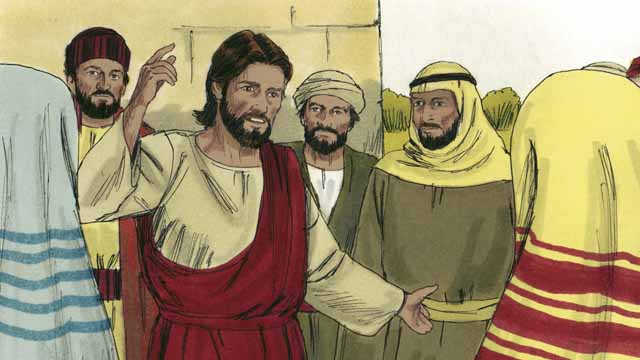
One day, Jesus was teaching many tax collectors and other sinners who had gathered to hear him.
一天,耶稣在教训人,很多税吏和罪人也跟着他。
Important Terms:
Translation Notes:
- One day - This phrase introduces an event that happened in the past, but does not state the specific time. Many languages have a similar way to begin telling a true story.
- tax collectors - Tax collectors were considered to be the worst of sinners because often they stole money from people by collecting a higher tax than the government required.
35-02
The Religious Leaders Grumbled [35-02]
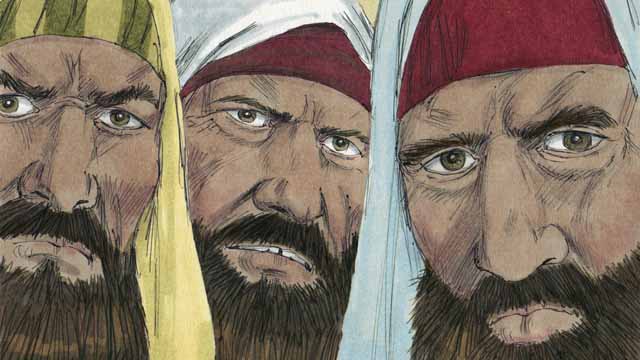
Some religious leaders who were also there saw Jesus treating these sinners as friends, and they began to criticize him to each other. So Jesus told them this story.
宗教领袖们相互抱怨,因为耶稣对这些税吏和罪人就像对待朋友。于是耶稣就说了一个故事。
Important Terms:
Translation Notes:
- story - Jesus used this story to teach truths about God's kingdom. It is not clear if the events actually happened or not. If your language has a term that includes both fictional and real stories, you should use it here.
35-03
The Two Sons [35-03]
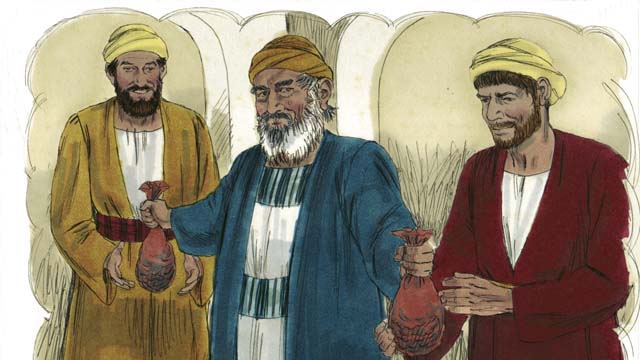
“There was a man who had two sons. The younger son told his father, ‘Father, I want my inheritance now!’ So the father divided his property between his two sons.”
“有一个人有两个儿子。小儿子对父亲说,‘父亲,我想要我的那份财产!’于是,父亲就将财产分给了两个儿子。”
Important Terms:
Translation Notes:
- (Jesus tells the story.)
- my inheritance - This could be translated as, "the part of your wealth that will be rightfully mine when you die."
- property - That is, "wealth" or, "possessions." This property would probably have included land, animals, and money.
35-04
The Younger Son [35-04]
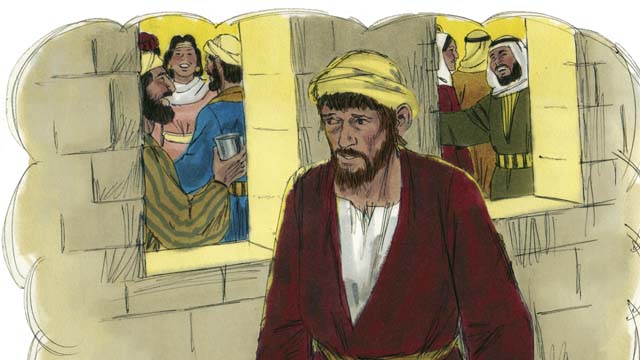
“Soon the younger son gathered all that he had and went far away and wasted his money in sinful living.”
“很快,小儿子就拿着自己所得的那份去了很远的地方,过上了骄奢淫逸的生活。
Important Terms:
Translation Notes:
- (Jesus continues the story.)
- wasted his money - That is, "spent all his money without getting anything of value in exchange." In some languages it can be translated as, "threw his money away" or, "ate all his money."
- sinful living - That is, "doing sinful things."
35-05
The Famine [35-05]
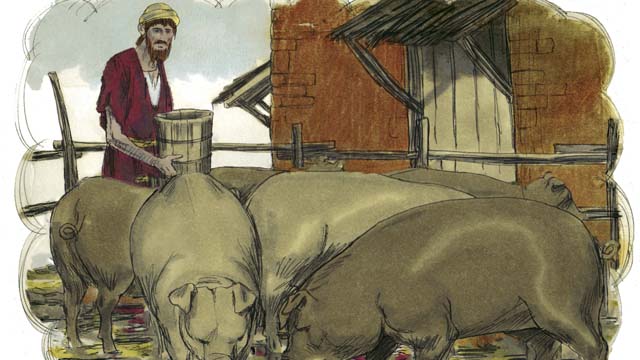
“After that, a severe famine happened in the land where the younger son was, and he had no money to buy food. So he took the only job he could find, feeding pigs. He was so miserable and hungry that he wanted to eat the pigs’ food.”
“那时候,那地有一个很严重的饥荒,他也没有钱买食物了,只好做起了喂猪的工作。他如此的穷困潦倒和饥饿,甚至想去吃猪食。”
Important Terms:
Translation Notes:
- (Jesus continues the story.)
- a severe famine happened - That is, "there was very little food." In some languages this might be translated as, "there was a severe famine."
- no money to buy food - Because of the famine, food was very expensive, and he had already spent all of his money.
- job - This refers to work that he would do for someone else in exchange for money. If this is not clear, this sentence could start with, "So in order to earn some money, he took the only job."
- feeding pigs - That is, "giving food to pigs." This would have been considered as one of the lowest jobs in society at this time. If your language has a certain word for low status jobs, use that word.
35-06
The Son Repented [35-06]
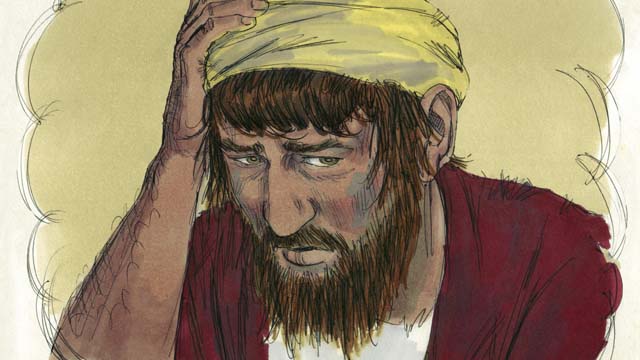
“Finally, the younger son said to himself, ‘What am I doing? All my father’s servants have plenty to eat, and yet here I am starving. I will go back to my father and ask to be one of his servants.’”
“最后,小儿子对自己说,‘我在干什么?我父亲的所有仆人都有足够的食物,而我在这里挨饿。我要回到我父那里去,当他的仆人。”
Important Terms:
Translation Notes:
- (Jesus continues the story.)
- What am I doing? - That is, "Why am I living like this?" or, " I should not be living like this!" or, "It doesn't make sense for me to live like this." The son isn't really asking a question, so some languages will have to translate this as a statement.
35-07
The Father's Welcome [35-07]
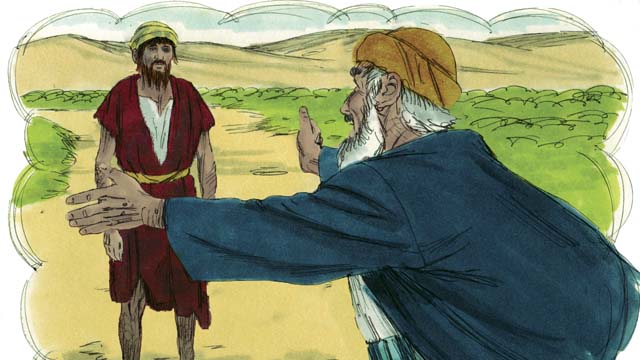
“So the younger son started back towards his father's home. When he was still far away, his father saw him and felt compassion for him. He ran to his son and hugged him and kissed him.”
“当小儿子还在很远的地方的时候,他的父亲看到他,就怜悯他。他跑向儿子,拥抱他,亲吻他。”
Important Terms:
Translation Notes:
- (Jesus continues the story.)
- still far away - This can also be translated as, "within sight of his father's home, but still a distance away." The son was getting close to his father's house but was still far enough away that most people in the house would not have seen him. Make sure it does not sound like he was still in a different country.
- felt compassion - That is, "felt deep love and pity."
35-08
I Have Sinned [35-08]
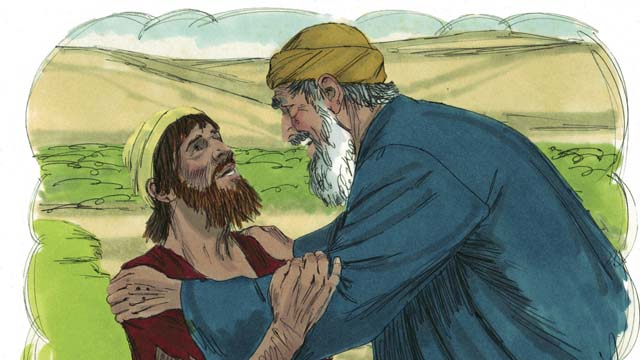
“The son said, ‘Father, I have sinned against God and against you. I am not worthy to be your son.’”
“小儿子说,‘父啊,我得罪了天,又得罪了你。我不配称为你的儿子。让我当你的仆人吧。’”
Important Terms:
Translation Notes:
- (Jesus continues the story.)
- sinned against God and against you - This could be translated as, "sinned against God, and I have also sinned against you."
- I am not worthy - It is also possible to say, "So I am not worthy" or, "As a result, I am not worthy."
35-09
Prepare the Feast [35-09]
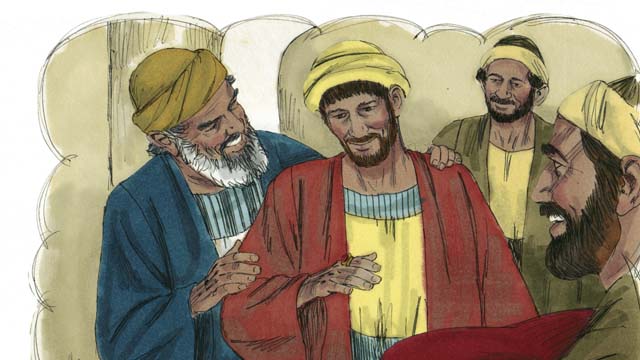
“But his father told one of his servants, ‘Go quickly and bring the best clothes and put them on my son! Put a ring on his finger and put sandals on his feet. Then kill the best calf so we can have a feast and celebrate, because my son was dead, but now he is alive! He was lost, but now he is found!’”
“父亲却对他的仆人们说,‘快去!拿最好的衣服来,给我的儿子穿上!给他戴上戒指,穿上凉鞋。去杀最好的羊,我们好好庆祝,因为我的儿子曾是死的,现在又活了!他曾经迷失,现在又找回来了!’”
Important Terms:
Translation Notes:
- (Jesus continues the story.)
- the best calf - This could also be translated as, "the fattest calf." This was the calf that had been fattened so that when cooked it would taste the best.
- My son was dead, but now he is alive! - That is, "This is like my son was dead and is alive again!" or, "I grieved as if my son had died, but now I rejoice because it is as if he has come back to life!" The father is using this expression to show how happy he is that his son has come home.
- He was lost, but now he is is found! - That is, "This is like I had lost him but now I have found him." This expression also shows how happy the father is about having his son at home again.
35-10
The Older Brother [35-10]
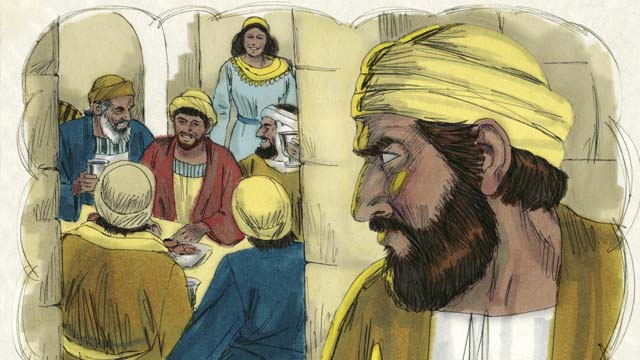
“So the people began to celebrate. Before long, the older son came home from working in the field. He heard the music and dancing and wondered what was happening.”
“他们就开始庆祝。不久,大儿子从田里回来。他听到音乐舞蹈的声音,就好奇发生了什么事情。”
Important Terms:
Translation Notes:
- (Jesus continues the story.)
- Before long - This can also be translated as, "Soon" or, "After a little while."
35-11
The Brother Is Angry [35-11]
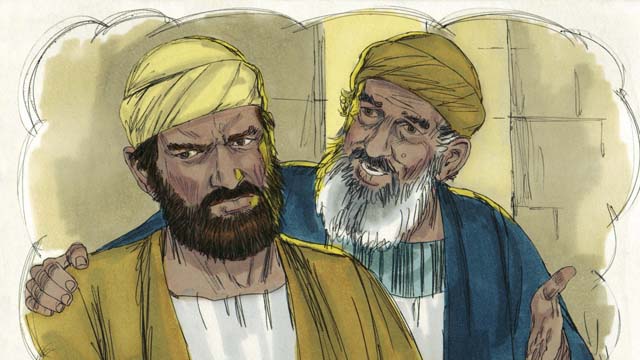
“When the older son found out that they were celebrating because his brother had come home, he was very angry and would not go into the house. His father came out and begged him to come and celebrate with them, but he refused.”
“他发现这个欢庆是因为他的兄弟回来了,就非常生气,不愿回家。他的父亲出来,恳求他去参加欢庆,但他拒绝了。”
Important Terms:
Translation Notes:
- (Jesus continues the story.)
35-12
Working for Nothing [35-12]
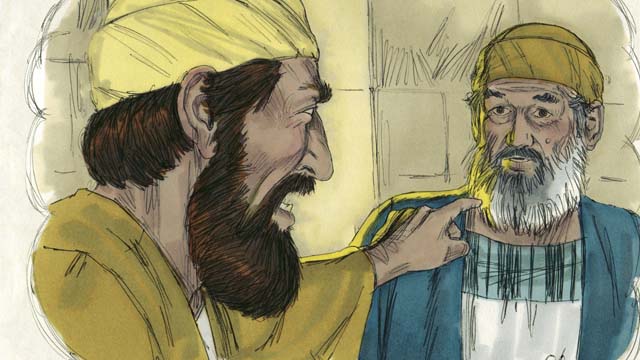
“The older son said to his father, ‘All these years I have worked faithfully for you! I never disobeyed you, and still you did not even give me one small goat so I could celebrate with my friends. But when this son of yours who consumed your money in sinful behavior came home, you killed the best calf for him!’”
“他说,‘这些年,我如此忠实的为你工作!我从没悖逆你,但你也从没有给我一头小羊,好让我和我的朋友们庆祝。但当这个花光你的钱,充满罪恶的儿子回来的时候,你却为他杀最好的羊庆祝!”
Important Terms:
Translation Notes:
- (Jesus continues the story.)
- one small goat - A small goat would have fed fewer people than the best calf, and would not be valued as much. The older brother is complaining that his father was treating the sinful younger son better than him.
- this son of yours - This expression shows that the older son was angry. It shows his rejection of his younger brother and his disapproval of his father for welcoming back this wayward son. Other languages may also have an indirect way of communicating these things.
- consumed your money - That is, "squandered the money that you gave him" or, "devoured your wealth." If possible, use an expression that shows the brother's anger.
- killed the best calf - That is, "killed the best calf to eat at a feast."
35-13
We Must Celebrate [35-13]
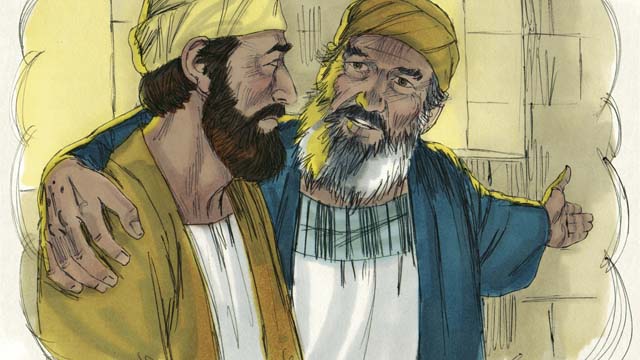
“The father answered, ‘My son, you are always with me, and everything I have is yours. But it is right for us to celebrate, because your brother was dead, but now is alive. He was lost, but now is found!’”
“父亲回答说,‘我的儿啊,你总与我在一起,我所有的都是你的。但我们所要庆祝的乃是对的,因为你的兄弟原来是死的,现在却活了。他曾是迷失的,现在却找回了。”
Important Terms:
Translation Notes:
- (Jesus continues the story.)
- it is right for us - That is, "it is the right thing for us to do" or, "it is proper for us."
- your brother - The father refers to his younger son as, "your brother" to remind the older son of his relationship to the younger son and of how he should love his younger brother.
- was dead, but now is alive - See how you translated this in [[:zh:obs:notes:frames:35-09|[35-09]]].
- He was lost, but now is found! - See how you translated this in [[:zh:obs:notes:frames:35-09|[35-09]]].
- A Bible story from - These references may be slightly different in some Bible translations.
